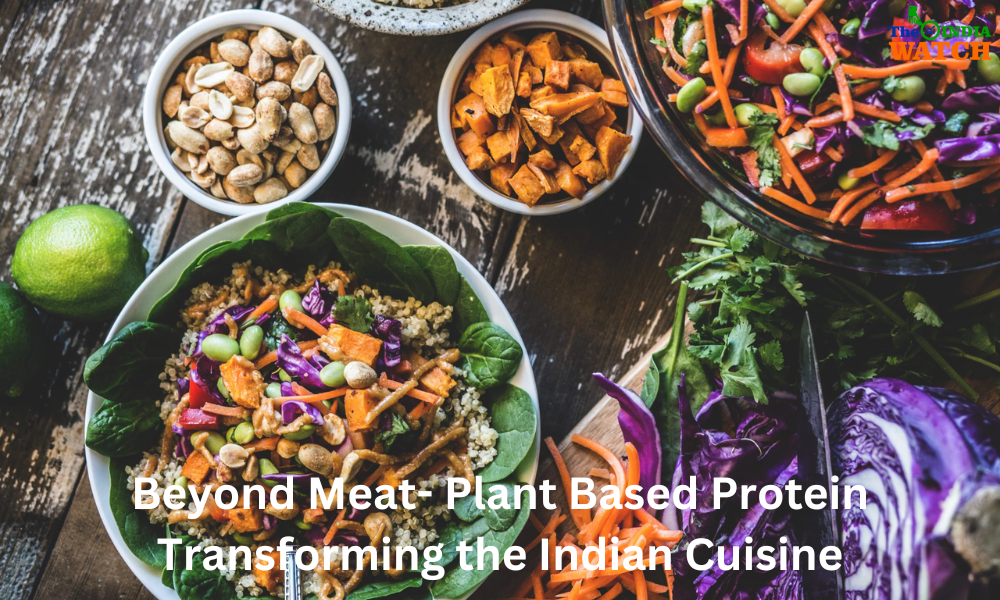-
Your trusted market research partner
- info@theindiawatch.com
- 8076704267

Beyond Meat- Plant Based Protein Transforming the Indian Cuisine
How mock meats are taking over India – Market Trends
There is a new protein source for vegetarians that is gaining momentum in the land of paneer and dal. Mock meat market in India is booming with a projected CAGR of 12.42% (2024-2028) and expected to reach USD 60.36 million by 2028.

Mock Meats are plant based, meat-like products prepared to resemble conventional meats and meat products in texture, consistency and mouth feel. Ingredients like soyabean, wheat protein, tempeh, and pea protein are subjected to yeast fungi-like processing into kebabs or a range of other meat forms. Additionally, vegetable substitutes such as cured jackfruit and eggplant having some spices like those used for cooking meat dishes can also be made through beatification techniques. Many indigenous food brands are coming out with foods that look, feel and taste like real meat. At the same time our best eateries are getting creative with meals that will cater for its growing demand. Textured Vegetable Protein (TVP) remains the most popular type of mock meat in India, but tempeh known for its unique texture and health benefits, has been experiencing the fastest growth rate.
How Vegetarian meat became a smart choice all of a sudden – The Growth Drivers
Mock-meat holds a great prospect for a more sustainable future. We can dramatically reduce our dependence on animal husbandry and its environmental impacts by embracing mock meats. Huge tracts of land are needed for livestock raising, either for grazing or feed production. Currently, around 60% of the world’s agricultural land consists of pastureland and it takes between 1600 to over 2,400 gallons of water to produce a pound of bee. In order to address this crisis plant-based protein is considered as viable solution in terms of helping drive growth toward plant-based meat.

Another reason why people like this mock meat trend is that they claim it is healthier than others. They expect vegetarian alternatives for chicken and mutton would have less cholesterol due to absence of lack animal fat but also higher nutritional value. Furthermore, demand in India of vegetarian meats is aimed at preventing non-communicable diseases like obesity and digestive disorders.
Availability everywhere through online or offline channels in addition to fast growing e-commerce industry will strengthen sector’s growth into the next years. Currently, several NGOs in India are engaging in animal rights awareness and sometimes even advocating for plant-based meat. Through this increased awareness that they create, there is a more open market for mock-meat companies.

Why is mock meat as a more ethical choice for animal-based meat
Some avoid consuming meat from animals on “ethical” grounds, as well as due to heightened awareness about cruelty meted on animals. Plant based meat allows one to enjoy the taste and cultural heritage that comes with meat-based foods but without the ethical dilemma or health problem which comes with animal-based meats.
Livestock raising contributes greatly to deforestation, water pollution and greenhouse gas emissions. Customers who go for vegetarian alternatives can help reduce environmental damage caused by beef production while dramatically cutting down their carbon footprint. Plant based mock meat production in India uses less feed, water and land hence it is a more sustainable alternative towards feeding an expanding populace. The growing part of Indian society is progressively attuned to the ethical aspect of eating plants since it aims at fostering love and compassion towards all the living creatures.
According to a 2018 report by the Open Philanthropy Project, around 200 billion land animals are farmed globally annually where many live in overcrowded and unhygienic environments. Animals suffer from stress, pain, and suffering due to these practices. But mock meat is made only of plants which means that there are no ethical issues involved in breeding and slaughtering them. By going for mock meat, consumers can have a delicious taste of meat they are used to without supporting animal cruelty in factory farms.
The innovations in the space – from pea protein to 3D printing
As the popularity of meat analogues made from plants increases, animal agriculture industry is trying to combat this trend in order not to lose its share in the market. Plant-based staples like tofu have been in the market for a long time. A new wave of artificial meat aims to mimic taste and texture, attracting meat eaters. India has also joined the trend with dynamic brands like Beyond burger and Impossible burger which provides plant-based burger. Everyday people come up with new ideas to make their products better for imitation meat business. Most of the big food chains have alternative options on their menus now. There was an impossible whopper introduced by Burger king while Tim Hortons started serving breakfast sandwiches with plant-based sausage; KFC test marketed beyond fried chicken among others.

Here are some developments that could become the hallmarks of big things to come:
• “Impossible Foods” and others have turned to AI for analysing and replicating the intricate textures and flavours of real meat. The company’s “heme”, which was created with AI, seeks to imitate a molecule found in animal muscles that contains amino acids thus giving a beefy essence.
• Startups like "Redefine Meat" are exploring 3D printing technology as an alternative for making customized artificial meat substitutes. This can create different textures, fat distribution, even marbling akin to certain cuts of beef.
• Mock meat firms now concentrate more on mimicking the fatty content and ‘bleeding’ attribute found in real meats. They are using plant-based heme like what “Beyond Meat” is doing.
• This breakthrough technology involves growing meat directly from animal cells in a lab setting. For instance, companies like “JUST Egg” are leading this movement with synthesized chicken nuggets.


The way forward – Your guide to market entry and growth
India’s mock meat market is slated for significant growth, and this is capitalized on by several factors. And so, here’s the roadmap to success with some key insights:
- With over 500 million vegetarians; India has got a ready consumer base for plant-based alternatives. The promotion of mock meats can revitalize vegetarian food. Additionally, one major factor that needs consideration for a brand to succeed is keeping affordability in mind. For example, since India is known as the biggest producer of pulses, using indigenous options like lentils and chickpeas can help save costs while at the same time sustain demand of this food. On top of that, it can be combined with imported proteins such as soy pea etc., thereby creating a competitive pricing environment.
- A survey found that 72% of Indians are interested in plant-based versions of their favourite dishes. This implies we may customize mock meats to suit regional tastes and expand appeal by developing mock kebabs, curries and street food favourites. Moreover, plant-based meats have less cholesterol and saturated fats compared to traditional meats hence highlighting its health benefits also works.
- As people are becoming aware, they must be educated about why mock meat is better than real meat, expose those myths and advocate for healthier alternatives.
- Partnering government agencies can unlock vital infrastructure support. For instance, based on the “Startup India” campaign it is possible for a person to make a contact with the Government officials. This way of partnership may provide financial aid, deregulate licensing restrictions or even facilitate establishment of such research canters as an incubator.
- Marketing and Distribution is a vital aspect. The target market for this product can be the consumers who are meat reducers and the health-conscious people. It was discovered in a survey that 36% of Indians would like to eat less meat, hence we can seize this chance to increase our business prospects. Additionally, it is important to ensure that there is efficient distribution process. Reaching out in major grocery stores, supermarkets and online platforms.
- Sustainability promotion and environmental benefits of plant-based meat compared to meat production can be used to attract vegans. Emphasize on such elements as animal cruelty, reduced water usage or land requirement.
- Working with chefs, foodservice companies and restaurants would make all the difference here. Developing new mock-meat dishes and menus by cashing in on India’s growing restaurant industry is a good idea here. These firms could also collaborate with established food producers to help them reach their clients through already existing wholesalers.
How can The India Watch help:
I. The India Watch can help with market research, surveys, tailor made insights to new businesses and start-ups entering the space.
II. We can help with feasibility studies, detailed project reports, etc. for new ventures.
III. We can help in other ancillary requirements such as research reports, corporate decks, investor presentation, etc.
Read Also- Feasibility Study Services for Preschool Ventures in India
Read Also- Market Reaserch & Feasibility Study Services to Start Dental Healthcare Ventures in India
Raed Also- India’s EV Sector 2030: Plenty of Opportunities Abound for Indigenous Manufacturers
Read Also- Chai Point and Chaayos Manages 51% of tea café business in India- The India Watch study reveals
Read Also- The wellness SPA sector in India is growing at a CAGR of 15.5%
Read Also- Project Feasibility Study for Detergent Business in India
